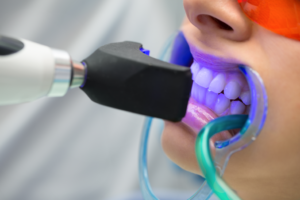What Happens After You Whiten Your Teeth? Insights from a Norwood Park Dentist

Over time, teeth can become discolored and stained due to our diet. While you have many over the counter products and options at your disposal, they don’t really come close to a professional teeth whitening procedure performed by your Norwood Park dentist. We’ve covered this procedure in depth in other articles on our blog, but we haven’t touched on the subject of what happens after the procedure. So, what exactly can you expect after your teeth whitening appointment with a Norwood Park dentist?
The Side Effects
While teeth whitening is a very safe procedure, there may be some side effects. This is attributable to hydrogen peroxide, which is the main active ingredient used for the treatment. However, even when they do come up, the effects are generally brief and mild. To start, your teeth may feel a bit sensitive after they’ve been whitened. This can last for one to two days, and the sensation ranges from a dull ache to sporadic pain. Most patients experiencing these side effects will find them very easy to manage, especially if you use some over the counter medication and avoid any cold or hot foods and drinks. Increased sensitivity is much more likely to occur if you have sensitive teeth before the treatment.
The patient may also experience gum irritation if their gums come into contact with the hydrogen peroxide. When this happens, the coloration of the gums will be temporarily lighter, and the sensation may last for a few hours. However, in most cases, it should go away within a day at most. This side effect is much less likely to occur if the dentist has experience with the whitening procedure. Since children and young teens have teeth that are still developing, they are more susceptible to these issues, which is why the procedure is not recommended for patients that are below the age of 16.
Over-bleaching
While the procedure is very safe, patients who opt in for too many whitening treatments in a short period of time run the risk of over-bleaching. When performed too often, the active ingredient used during the treatment will start to eat away at the tooth enamel, leaving the soft inner tissues exposed. At this point, patients often experience long lasting sensitivity, and the teeth can start to show discoloration due to the fact that dentin is a darker color than enamel. The teeth also become more prone to disease and injury, and they may require dental crowns or porcelain veneers for protection. It’s important to have a discussion with your dentist to make sure your teeth are healthy enough for the whitening procedure.
The Limitations of the Procedure
The teeth whitening procedure, while very effective against surface stains, does have its limitations. If your teeth have deeper stains, which could be formed after an injury or after using certain medication or fluoride, a regular procedure may not be enough to reduce these stains. In fact, depending on their severity, some stains may not be removable at all. In this case, the dentist will likely recommend an alternative procedure such as veneers or dental bonding. The last thing to note is that teeth whitening is ineffective against crowns, veneers, and visible fillings.
Are you interested in professional teeth whitening in Norwood Park?
Professional teeth whitening is a very effective process, and while it cannot address very serious stains, it is currently the fastest and safest method available to whiten your teeth. If you are interested in teeth whitening in Norwood Park, contact our dental office today to schedule an appointment with Dr. Ziols.

